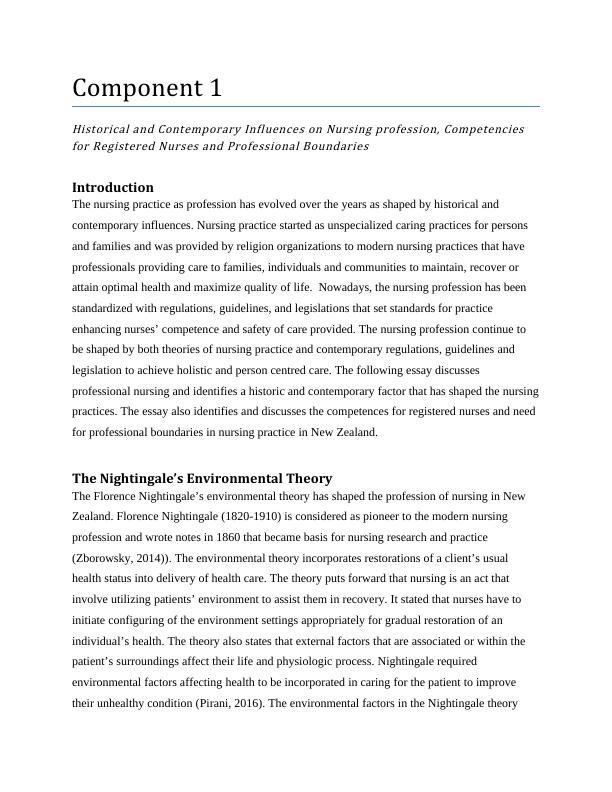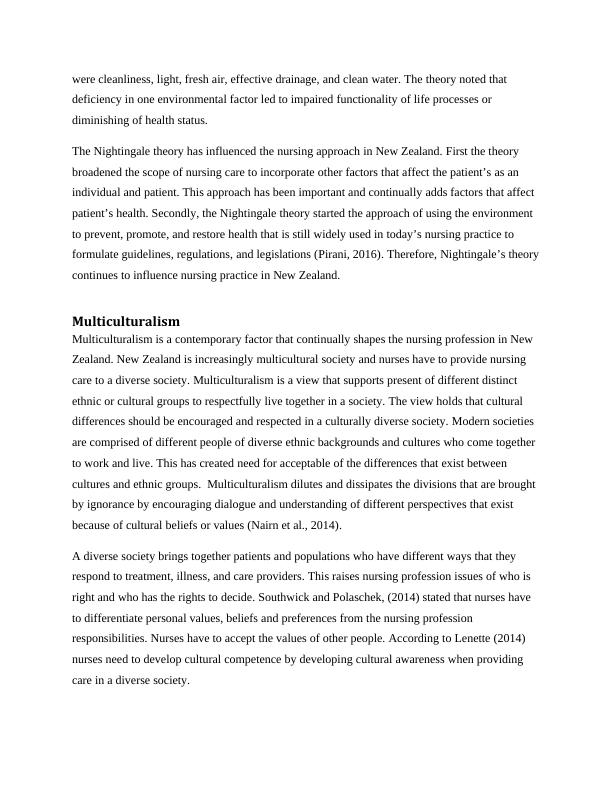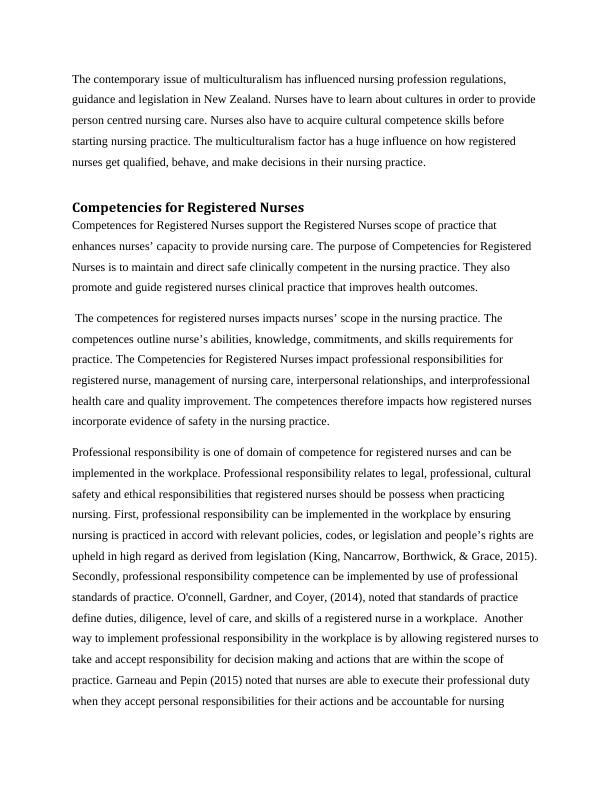Influences on Nursing Profession and Competencies for Registered Nurses
Citing sources with APA, in-text citation examples, creating a reference list, and using APA resources.
11 Pages3482 Words60 Views
Added on 2023-01-17
About This Document
This article discusses the historical and contemporary influences on the nursing profession, including the Nightingale's environmental theory and the impact of multiculturalism. It also explores the competencies required for registered nurses and the importance of professional boundaries in delivering quality nursing care.
Influences on Nursing Profession and Competencies for Registered Nurses
Citing sources with APA, in-text citation examples, creating a reference list, and using APA resources.
Added on 2023-01-17
ShareRelated Documents
UNIT:
NAME:
DATE:
NAME:
DATE:

Component 1
Historical and Contemporary Influences on Nursing profession, Competencies
for Registered Nurses and Professional Boundaries
Introduction
The nursing practice as profession has evolved over the years as shaped by historical and
contemporary influences. Nursing practice started as unspecialized caring practices for persons
and families and was provided by religion organizations to modern nursing practices that have
professionals providing care to families, individuals and communities to maintain, recover or
attain optimal health and maximize quality of life. Nowadays, the nursing profession has been
standardized with regulations, guidelines, and legislations that set standards for practice
enhancing nurses’ competence and safety of care provided. The nursing profession continue to
be shaped by both theories of nursing practice and contemporary regulations, guidelines and
legislation to achieve holistic and person centred care. The following essay discusses
professional nursing and identifies a historic and contemporary factor that has shaped the nursing
practices. The essay also identifies and discusses the competences for registered nurses and need
for professional boundaries in nursing practice in New Zealand.
The Nightingale’s Environmental Theory
The Florence Nightingale’s environmental theory has shaped the profession of nursing in New
Zealand. Florence Nightingale (1820-1910) is considered as pioneer to the modern nursing
profession and wrote notes in 1860 that became basis for nursing research and practice
(Zborowsky, 2014)). The environmental theory incorporates restorations of a client’s usual
health status into delivery of health care. The theory puts forward that nursing is an act that
involve utilizing patients’ environment to assist them in recovery. It stated that nurses have to
initiate configuring of the environment settings appropriately for gradual restoration of an
individual’s health. The theory also states that external factors that are associated or within the
patient’s surroundings affect their life and physiologic process. Nightingale required
environmental factors affecting health to be incorporated in caring for the patient to improve
their unhealthy condition (Pirani, 2016). The environmental factors in the Nightingale theory
Historical and Contemporary Influences on Nursing profession, Competencies
for Registered Nurses and Professional Boundaries
Introduction
The nursing practice as profession has evolved over the years as shaped by historical and
contemporary influences. Nursing practice started as unspecialized caring practices for persons
and families and was provided by religion organizations to modern nursing practices that have
professionals providing care to families, individuals and communities to maintain, recover or
attain optimal health and maximize quality of life. Nowadays, the nursing profession has been
standardized with regulations, guidelines, and legislations that set standards for practice
enhancing nurses’ competence and safety of care provided. The nursing profession continue to
be shaped by both theories of nursing practice and contemporary regulations, guidelines and
legislation to achieve holistic and person centred care. The following essay discusses
professional nursing and identifies a historic and contemporary factor that has shaped the nursing
practices. The essay also identifies and discusses the competences for registered nurses and need
for professional boundaries in nursing practice in New Zealand.
The Nightingale’s Environmental Theory
The Florence Nightingale’s environmental theory has shaped the profession of nursing in New
Zealand. Florence Nightingale (1820-1910) is considered as pioneer to the modern nursing
profession and wrote notes in 1860 that became basis for nursing research and practice
(Zborowsky, 2014)). The environmental theory incorporates restorations of a client’s usual
health status into delivery of health care. The theory puts forward that nursing is an act that
involve utilizing patients’ environment to assist them in recovery. It stated that nurses have to
initiate configuring of the environment settings appropriately for gradual restoration of an
individual’s health. The theory also states that external factors that are associated or within the
patient’s surroundings affect their life and physiologic process. Nightingale required
environmental factors affecting health to be incorporated in caring for the patient to improve
their unhealthy condition (Pirani, 2016). The environmental factors in the Nightingale theory

were cleanliness, light, fresh air, effective drainage, and clean water. The theory noted that
deficiency in one environmental factor led to impaired functionality of life processes or
diminishing of health status.
The Nightingale theory has influenced the nursing approach in New Zealand. First the theory
broadened the scope of nursing care to incorporate other factors that affect the patient’s as an
individual and patient. This approach has been important and continually adds factors that affect
patient’s health. Secondly, the Nightingale theory started the approach of using the environment
to prevent, promote, and restore health that is still widely used in today’s nursing practice to
formulate guidelines, regulations, and legislations (Pirani, 2016). Therefore, Nightingale’s theory
continues to influence nursing practice in New Zealand.
Multiculturalism
Multiculturalism is a contemporary factor that continually shapes the nursing profession in New
Zealand. New Zealand is increasingly multicultural society and nurses have to provide nursing
care to a diverse society. Multiculturalism is a view that supports present of different distinct
ethnic or cultural groups to respectfully live together in a society. The view holds that cultural
differences should be encouraged and respected in a culturally diverse society. Modern societies
are comprised of different people of diverse ethnic backgrounds and cultures who come together
to work and live. This has created need for acceptable of the differences that exist between
cultures and ethnic groups. Multiculturalism dilutes and dissipates the divisions that are brought
by ignorance by encouraging dialogue and understanding of different perspectives that exist
because of cultural beliefs or values (Nairn et al., 2014).
A diverse society brings together patients and populations who have different ways that they
respond to treatment, illness, and care providers. This raises nursing profession issues of who is
right and who has the rights to decide. Southwick and Polaschek, (2014) stated that nurses have
to differentiate personal values, beliefs and preferences from the nursing profession
responsibilities. Nurses have to accept the values of other people. According to Lenette (2014)
nurses need to develop cultural competence by developing cultural awareness when providing
care in a diverse society.
deficiency in one environmental factor led to impaired functionality of life processes or
diminishing of health status.
The Nightingale theory has influenced the nursing approach in New Zealand. First the theory
broadened the scope of nursing care to incorporate other factors that affect the patient’s as an
individual and patient. This approach has been important and continually adds factors that affect
patient’s health. Secondly, the Nightingale theory started the approach of using the environment
to prevent, promote, and restore health that is still widely used in today’s nursing practice to
formulate guidelines, regulations, and legislations (Pirani, 2016). Therefore, Nightingale’s theory
continues to influence nursing practice in New Zealand.
Multiculturalism
Multiculturalism is a contemporary factor that continually shapes the nursing profession in New
Zealand. New Zealand is increasingly multicultural society and nurses have to provide nursing
care to a diverse society. Multiculturalism is a view that supports present of different distinct
ethnic or cultural groups to respectfully live together in a society. The view holds that cultural
differences should be encouraged and respected in a culturally diverse society. Modern societies
are comprised of different people of diverse ethnic backgrounds and cultures who come together
to work and live. This has created need for acceptable of the differences that exist between
cultures and ethnic groups. Multiculturalism dilutes and dissipates the divisions that are brought
by ignorance by encouraging dialogue and understanding of different perspectives that exist
because of cultural beliefs or values (Nairn et al., 2014).
A diverse society brings together patients and populations who have different ways that they
respond to treatment, illness, and care providers. This raises nursing profession issues of who is
right and who has the rights to decide. Southwick and Polaschek, (2014) stated that nurses have
to differentiate personal values, beliefs and preferences from the nursing profession
responsibilities. Nurses have to accept the values of other people. According to Lenette (2014)
nurses need to develop cultural competence by developing cultural awareness when providing
care in a diverse society.

The contemporary issue of multiculturalism has influenced nursing profession regulations,
guidance and legislation in New Zealand. Nurses have to learn about cultures in order to provide
person centred nursing care. Nurses also have to acquire cultural competence skills before
starting nursing practice. The multiculturalism factor has a huge influence on how registered
nurses get qualified, behave, and make decisions in their nursing practice.
Competencies for Registered Nurses
Competences for Registered Nurses support the Registered Nurses scope of practice that
enhances nurses’ capacity to provide nursing care. The purpose of Competencies for Registered
Nurses is to maintain and direct safe clinically competent in the nursing practice. They also
promote and guide registered nurses clinical practice that improves health outcomes.
The competences for registered nurses impacts nurses’ scope in the nursing practice. The
competences outline nurse’s abilities, knowledge, commitments, and skills requirements for
practice. The Competencies for Registered Nurses impact professional responsibilities for
registered nurse, management of nursing care, interpersonal relationships, and interprofessional
health care and quality improvement. The competences therefore impacts how registered nurses
incorporate evidence of safety in the nursing practice.
Professional responsibility is one of domain of competence for registered nurses and can be
implemented in the workplace. Professional responsibility relates to legal, professional, cultural
safety and ethical responsibilities that registered nurses should be possess when practicing
nursing. First, professional responsibility can be implemented in the workplace by ensuring
nursing is practiced in accord with relevant policies, codes, or legislation and people’s rights are
upheld in high regard as derived from legislation (King, Nancarrow, Borthwick, & Grace, 2015).
Secondly, professional responsibility competence can be implemented by use of professional
standards of practice. O'connell, Gardner, and Coyer, (2014), noted that standards of practice
define duties, diligence, level of care, and skills of a registered nurse in a workplace. Another
way to implement professional responsibility in the workplace is by allowing registered nurses to
take and accept responsibility for decision making and actions that are within the scope of
practice. Garneau and Pepin (2015) noted that nurses are able to execute their professional duty
when they accept personal responsibilities for their actions and be accountable for nursing
guidance and legislation in New Zealand. Nurses have to learn about cultures in order to provide
person centred nursing care. Nurses also have to acquire cultural competence skills before
starting nursing practice. The multiculturalism factor has a huge influence on how registered
nurses get qualified, behave, and make decisions in their nursing practice.
Competencies for Registered Nurses
Competences for Registered Nurses support the Registered Nurses scope of practice that
enhances nurses’ capacity to provide nursing care. The purpose of Competencies for Registered
Nurses is to maintain and direct safe clinically competent in the nursing practice. They also
promote and guide registered nurses clinical practice that improves health outcomes.
The competences for registered nurses impacts nurses’ scope in the nursing practice. The
competences outline nurse’s abilities, knowledge, commitments, and skills requirements for
practice. The Competencies for Registered Nurses impact professional responsibilities for
registered nurse, management of nursing care, interpersonal relationships, and interprofessional
health care and quality improvement. The competences therefore impacts how registered nurses
incorporate evidence of safety in the nursing practice.
Professional responsibility is one of domain of competence for registered nurses and can be
implemented in the workplace. Professional responsibility relates to legal, professional, cultural
safety and ethical responsibilities that registered nurses should be possess when practicing
nursing. First, professional responsibility can be implemented in the workplace by ensuring
nursing is practiced in accord with relevant policies, codes, or legislation and people’s rights are
upheld in high regard as derived from legislation (King, Nancarrow, Borthwick, & Grace, 2015).
Secondly, professional responsibility competence can be implemented by use of professional
standards of practice. O'connell, Gardner, and Coyer, (2014), noted that standards of practice
define duties, diligence, level of care, and skills of a registered nurse in a workplace. Another
way to implement professional responsibility in the workplace is by allowing registered nurses to
take and accept responsibility for decision making and actions that are within the scope of
practice. Garneau and Pepin (2015) noted that nurses are able to execute their professional duty
when they accept personal responsibilities for their actions and be accountable for nursing

End of preview
Want to access all the pages? Upload your documents or become a member.
Related Documents
Florence Nightingale's Contribution to Nursinglg...
|5
|1758
|108
Nursing Knowledge: Philosophy to Practicelg...
|13
|4106
|182
Nursing Roles and Values Essaylg...
|10
|1717
|57
Nursing : Theory of the Healing Environmentlg...
|11
|2757
|17
Essay on Nursing Philosophylg...
|3
|459
|57
Nursing and Knowledgelg...
|9
|2607
|405
